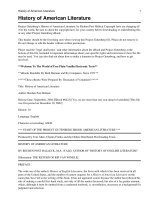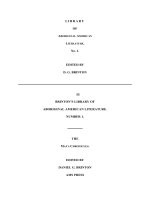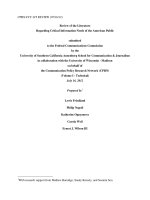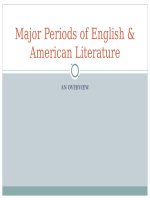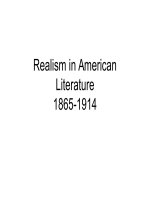American literature
Bạn đang xem bản rút gọn của tài liệu. Xem và tải ngay bản đầy đủ của tài liệu tại đây (1.24 MB, 35 trang )
American Literature
Periods of Am. Lit.
1.
Beginning of American Literature:
1607-1776 Colonial Period
1765-1790 The Revolutionary Age
1775-1828 The Early National Period
2. Romanticism,
Transcendentalism
1828-1865
The Romantic Period
(Also known as:
TheAmerican Renaissance)
The Age of Transcendentalism 18651900
3. Realism, Naturalism
The Realistic Period 1900-1914
The Naturalistic Period (extreme realism)
1914-1939 1920s 1920s, 1930s:
American Modernist Period:
Jazz Age,
Harlem Renaissance
The "Lost Generation"
1939-present 1950s 1960s, 1970s
The Contemporary Period:
The Beat generation
American Literature recognizes works
of:
African-American Writers
Native American Writers
Asian-American Writers
Colonial Period
Periods of Am. Literature vary a lot
It´s impossible to give exact dates
The first literature started to
appear after
founding of the first settlement at
Jamestown in 1607
It continuoud till the outbreak of the
Revolution
Literary genres:
Historical writings
Religious themes –
sermons (kázání)
tracts
Writers:
Anne Bradstreet (poet)
Benjamin Franklin (The Way to Wealth)
William Bradford
The Revolutionary Age
The greatest documents of American
history were authored:
Thomas Paine (Common Sense – he
urged independence)
The Declaration of Independence
(Thomas Jefferson - 1776)
The Constitution
(1789 - ratified)
The Early National Period
Beginnings of true Am. Literature
The writers wrote in th English style but
the settings, themes and characters were
authentically American
Washington Irving – he wrote about Am.
Life, biography of G. Washington
James Fenimore Cooper – The Last of the
Mohicans
Edgar Allan Poe
E.A.Poe (1809-1849)
son of a poor actress (drastic death)
his father alcoholic
He was taken by his guardian Mr. Allan
Studied West Point – kicked out
Marriage with 13 year-old cousin
She died of TB ten years later – despair,
grief was reflected in his works
1849 found delirious in a steet
The Raven (poem) -
a tired, unhappy
student asks if he ever meets his love
again
His doubts are underlined by the raven´s
repetition „nevermore“,
symbol of doubts and longing
The Golden Bug
The Pit and the Pendulum
The Black Cat
The Murders in the Rue Morgue
The Fall of the House of Usher
His work:
1. realism: detective stories – logical,
brilliant, rational
2. romanticism – irrationalism, mystery,
violence, criminality, death, passion
Perverse, vulgar, grotesque style.
Transcendentalism
American reflection of European
romanticism
Philosophical movement
The transcendal philosophy was based
on:
1.
Free will
Humanity
Intuition
Individual conscience
It glories nature
2.
3.
4.
5.
All transcendentalists were isolated people
They lived in „Utopian Community“ –
Brookfarm near Boston
The individual can transcend the world
and discover union with God and Ideal
Main representatives:
Ralph Waldo Thoreau
Henry David Thoreau
Other Romantic Writers
Herman Melville – symbolist (Moby-Dick)
Nathaniel Hawthorne (The Scarlet Letter)
the main theme –sin
Hester has te wear letter A – means adulteress
Walt Whitman (poet)
Emily Dickinson (poet)
Realistic Period
After Civil War:
Social injustice – first millionaires appear
(Rockefeller)
discoveries in science (railway, telegraph
cable, telephone,…)
Growth of education
Twain called this period „gilded age“
Realism
Action against romanticism
Main literary form – novel
Authors accuse romanticism of falsehood
They describe common things, common
places, everyday life
Mark Twain
His real name: Samuel Langorne Clemens
He spent his childhood on the Mississippi
river
Workedon a steamboat on the Mississippi
Travelled a lot
He recollects his childhood in his books
The Innocents Abroad
The Gilded Age
The Adventures of Tom Sawyer
The Advedntures of Huckleberry Finn
Tom likes danger, he´s always able to
avoid problems, Huck represents social
conscience, he´s sensitive to everything
around him
Naturalism
Derived from the word nature (interest in
nature)
It has its origin in France – Zola
Prople are influenced by environmental
forces (outside us) and inner drives (inside
us) – peole can ´t control them
The main drives of characters: hunger,
fear, sex, …
Their writings are often cruel and tragic.
Stephen Crane
Jack London (Tjhe Call of the Wild)
Theodore Dreiser (An American Tragedy)
Upton Sinclair (The Jungle)


